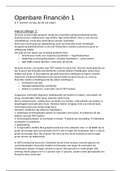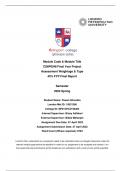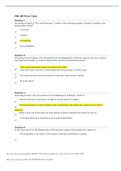CEP lecture 6 20-12-2018
2
Talking about morality today and what it’s got to do with consumer behavior. I’ve talked to you along the way
about economic theory in terms of thinking that human beings are rational and that they make decisions about
consumer choices, that are based on their self-interest, so they carefully weigh out all of their options and then
they choose an option in their self-interest. As you know, we’ve had a lot of speakers that say that’s not nearly
how it seems to work. Also the case with morality, it seems to be that people do often act in ways that are not in
their self-interest, they act in moral ways, even if it cost them money and even if it’s not in their self-interest. So
we see people who donate money to charity and it’s not fnancially in their beneft to do so but they might feel
good about it in other ways, they may buy environmentally friendly products that cost more often so that’s not
self-interested either and people recycle and things like that even though that’s quite efortful behavior so they
are not very self-interested. Another thing about morality that might be interesting from a consumer point of
view is that we might be able to infuence people to consume in a more moral way, so to make more moral
consumer choices. Of course there’s efects around that that you might think that’s not very moral to start,
trying to infuence people’s choices, but this is what is being done everyday in the market. What we are trying
to use is the tools that we know to infuence people to make good choices and then moral choices.
3
Why do we behave in a way? What kind of things determine our behavior? We know that behavior is afected by
specifc situational factors, so whatever you get in the immediate context. So, we know that if I place you under
time pressure, and then I put you in situation where you have to help somebody, you’re probably less likely to
stop and help that person, if you got a serious time pressure on you. So if you’re on your way to the exam and
you’re coming back from Christmas and you’re running late for that exam, you’re probably less likely to help
someone who needs help along the way than when you got plenty of time and you’re not constrained of time.
So we know that contextual situational factors afect behavior. But there are other factors that afect behavior
that are not so obvious and people might still stop and help the person even though they’re running late. So
sometimes there’s something else going on and we can’t really pin it down to the situation/situational factors.
When we’re unable to explain things using situational factors, we might say that these things are due to
individual characteristics. We’ve looked at some of these things already like values, goals, diferent priorities
that people have. These kind of characteristics that we have are shaped as we’ve already seen in other lectures
by our upbringing, culture (we had a lecture on culture) and individual histories. So as we move along the way,
we become the person that we are and we start to have our own ideas about what we value, what our goals are,
what we believe is a moral behavior and so on.
4
Our diferent life histories will lead us to value diferent things, they lead us to have diferent goals and lead us
to have diferent senses/ideas of what is right and wrong (moral identity). See the cartoon. The turtle asks what
is morality? It really depends on your individual history and how you’ve been shaped in the context that you’ve
lived in as to how you might defne morality. De 4 dieren hebben allemaal een eigen idee van moraliteit. The
bear says it’s what Jesus would do, so he clearly had quite spiritual/religious upbringing. The ape thinks it’s
about what’s best for each person, about looking after society as a whole (it’s what achieves the highest well
being for each person). So for him morality is about altruistic kinds of goals of societal goals. For the dog
morality means carbon neutral, so his goals have shaped him to be environmentally aware. So we all have
diferent goals and diferent senses of moral identity. For some people, morality is really central to their identity,
to who they are. So it’s really important for them that they act in moral ways. For other people, it’s not so
important that they behave morally, so they are more driven by their kinds of self-interest and so on.
5
We saw also in an earlier lecture that we’ve tried to summarize these values and goals in categories, so we tried
to categorize them. And we can broadly categorize them into 2 general areas. One are the self-enhancement
types of values and goals and one are the self-transcendent types of values and goals. They are kind of
opposite, opposing each other.
> Self-enhancement: self-interested goals hedonic (fun) and egoistic (fnancial) goals.
Are more about what is good for us, self-interested goals. Things like the hedonic goals, you try to fnd
pleasureable things and avoid discomfort and stuf like that. You try to have lots of fun. The other goals are
egoistic and that’s more about fnancial resource dependent self-interest. It might not be just about collecting
lots of money, might be about getting status and new job and having a successful career. But both of these
goals are about us as individuals and trying to be self-interested.
> Self-transcendent: moral goals altruistic and biospheric. People can have diferent goals at diferent times.
These goals are more when we look outward to other people. They are not really about us and that’s kind of
what we tend to talk about when we look at moral goals. Things that aren’t about individuals, but about looking
after society. Broadly there are 2 kinds of goals. One is altruistic, about helping people and looking after society.
The other is biospheric, which is about looking at the earth and the planet and the environment and so on. The
goals are quite fuent and we won’t behave completely self-interested all the time and behave this way all the
time. Sometimes we may have some goals but we still go shopping at Action or whatever stuf that we shouldn’t
buy. So we pop in and out of these roles. We are neither one or the other. We pursue diferent goals at diferent
times.
6
How these sorts of things interact, how the environmental determininants of behavior can interact with our
moral individual characteristics, our moral goals and so on. So features of the environment that we come across
can activate (draw attention to) diferent goals and values that we might have. Vohs et al. found that if you
remind people of money, they behave in more selfsh ways. So these researchers had people play a game of
monopoly and at the end of the game they counted up the money. Those people who had lots of money left
, over got put in a situation where they had to help somebody who just dropped all of their papers. The ones left
with more money were less likely to help than the ones with less money. So reminding people about money
makes them behave more selfshly which is kind of interesting. This suggests that if we draw attention to certain
types of goals, we are going to reduce focus on other more “moral” goals. If we prime them in that moment,
that will reduce the focus on the moral goals. And it can work vice versa as well, so if you prime moral goals in a
particular situation, that makes them more accessible and people would behave more morally as well which
could be a good thing too. Ad on morality, which connects to what marketing is doing and how they are using
these moral tricks and ideas to get us to buy stuf basically. It’s an Thai ad for life insurance. They are using
these moral goals in there to prime the sense of morality and overcoming situational things. It’s on life
insurance which is something that you would pay until now, what you would get no beneft from, that’s for you
descendants they beneft. That’s a relevant goal to try to prime for life insurance where you really need to be
altruistic in order to have you spend money on it.
7
Reading I gave you to look at today is by Aquino et al. (2009). Quite complicated article. So I am going to break
it down today and talk about all of the 4 studies. I really want to de-emphasize all the statistics and analyses,
they are complicated. I want to focus on what they found and the results. You can also take that approach for
the exam. I am not asking difcult statistical questions about the methodology or the analysis. They were
picking up on this idea that behavior is afected by situational factors but also some kinds of individual
characteristics. They were specifcally predicting interaction between these two types of drivers. They would say
that situational factors are going to afect behavior, if we prime diferent goals in the immediate context that is
going to afect whether people behave morally or in a self-interested way. They also predicted that how central
morality was to person’s self-concept/identity, how important someone’s sense of morality was to them, would
predict moral behavior. If it’s very important to you that you behave in a moral way, you are going to do more
moral things in your behavior. If you don’t think so, you are not going to. But they also thought that priming a
moral goal would have more efect on moral behavior for people for whom moral identity is not that important,
less central to their identity. So if they prime morality, it’s going to increase moral behavior, but it’s going to do
it even more so if morality is not important to you. Does that make sense? Why would it be that if I prime
morality and you don’t really see yourself as a moral person, then it’s going to have more efect on your
behavior? Cognitive dissonance is potentially one explanation for this. I was looking for a more simple
explanation. If you’re already a moral person, see yourself as moral person, you’re likely to already behave in a
moral way. If I prime morality it’s not going to have much efect on you because you’re already engaging in that
behavior. If you’re somebody who’s not really focused on morality at all, and I prime morality, it’s more likely to
change behavior because you were not already behaving that way, so I can actually see some shift in your
behavior by doing that. And they thought it was vice-versa as well. So if you are high in morality, see you self as
a moral person, and I prime self-interested goals (fnancial goals), it would have more efect on people who are
very high in morality. Because again if you’re self-interested anyway and I prime self-interested goals that’s not
going to afect your behavior because you’re going to do that anyway. But if you are quite a moral person and I
prime self-interested goals, then I can shift your behavior a bit more.
8
They used students for all of these studies. Remember very frst lecture I gave you which told that a lot of this
research focuses on students so you take that with a grain of salt. In the frst study, they had students to
complete a survey frst of all to fnd out how central morality was to their self-concept. 24 hours later they came
back and they did a general knowledge quiz. He randomly assigned them to one of two groups. The frst group,
their test was all about listing the 10 commandments. I want to know how well you remember the 10
commandments. That would be a moral prime, thinking about doing the good things and doing the right things.
The other group had to list the largest 5 U.S. cities. That was no prime, because it’s not a self-interested prime
and not a moral prime so they really were a control group. Next he put them into a situation where they had to
decide to do behavior. It wasn’t actual behavior, it was intention. He told them that they were going to be brand
manager for some cereal. And that they would been asked to donate 25cts from each box of cereal to charity. If
they did that, it would mean that the profts for the company for the year would be reduced and they would be
less likely to get an individual bonus. It’s saying to them: Are you going to donate this money and doing
altruistic, something for the good, it’s going to be worse for you overall? They also measured at the same time
how accessible moral identity was to them at the time. So he gave them a whole list of diferent traits and one
of them was I am a moral person and they had to say if they felt that way at the moment. They wanted to see if
they were feeling moral and if they intented to donate the money or not.
9
What they found was that generally using a moral prime activates a person’s moral identity. So people tended
to say when they were in that moral condition that they felt more of a moral person. Moral prime also increases
the intention to engage in a moral act. So people who were in moral condition were more likely to say they were
going to donate the 25cts. Interesting part was that they found the interaction they were looking for. They found
that the efect was stronger for people for whom moral identity was LESS central to their self-concept, so people
who hadn’t felt like a very moral person before, you prime them with moral cues and then they are much more
likely to give away the 25cts. As we talked about before, that’s because people who already think morality is
part of their self-concept are likely to behave morally anyway, we can’t shift their behavior as much.
10
In study 2 he had a diferent group of students and he measured the centrality of their moral concept/identity.
He put them into 2 random groups. One group had a fnancial incentive, so this time he is priming self-
interested goals, the other group had no fnancial incentive. Group 1 were told if you perform the best in this
task all the other participants are going to give you hundred dollars. Group 2 were told one of you is going to
get a hundred dollars, we’re going to randomly chose somebody at the end. Then they were given a negotiation
scenario. They were told they were going to have to take this negotiation. In this negotiation they were a
manager and they interviewed a job candidate. The job candidate really wanted a job for quite a long time, they
2
Talking about morality today and what it’s got to do with consumer behavior. I’ve talked to you along the way
about economic theory in terms of thinking that human beings are rational and that they make decisions about
consumer choices, that are based on their self-interest, so they carefully weigh out all of their options and then
they choose an option in their self-interest. As you know, we’ve had a lot of speakers that say that’s not nearly
how it seems to work. Also the case with morality, it seems to be that people do often act in ways that are not in
their self-interest, they act in moral ways, even if it cost them money and even if it’s not in their self-interest. So
we see people who donate money to charity and it’s not fnancially in their beneft to do so but they might feel
good about it in other ways, they may buy environmentally friendly products that cost more often so that’s not
self-interested either and people recycle and things like that even though that’s quite efortful behavior so they
are not very self-interested. Another thing about morality that might be interesting from a consumer point of
view is that we might be able to infuence people to consume in a more moral way, so to make more moral
consumer choices. Of course there’s efects around that that you might think that’s not very moral to start,
trying to infuence people’s choices, but this is what is being done everyday in the market. What we are trying
to use is the tools that we know to infuence people to make good choices and then moral choices.
3
Why do we behave in a way? What kind of things determine our behavior? We know that behavior is afected by
specifc situational factors, so whatever you get in the immediate context. So, we know that if I place you under
time pressure, and then I put you in situation where you have to help somebody, you’re probably less likely to
stop and help that person, if you got a serious time pressure on you. So if you’re on your way to the exam and
you’re coming back from Christmas and you’re running late for that exam, you’re probably less likely to help
someone who needs help along the way than when you got plenty of time and you’re not constrained of time.
So we know that contextual situational factors afect behavior. But there are other factors that afect behavior
that are not so obvious and people might still stop and help the person even though they’re running late. So
sometimes there’s something else going on and we can’t really pin it down to the situation/situational factors.
When we’re unable to explain things using situational factors, we might say that these things are due to
individual characteristics. We’ve looked at some of these things already like values, goals, diferent priorities
that people have. These kind of characteristics that we have are shaped as we’ve already seen in other lectures
by our upbringing, culture (we had a lecture on culture) and individual histories. So as we move along the way,
we become the person that we are and we start to have our own ideas about what we value, what our goals are,
what we believe is a moral behavior and so on.
4
Our diferent life histories will lead us to value diferent things, they lead us to have diferent goals and lead us
to have diferent senses/ideas of what is right and wrong (moral identity). See the cartoon. The turtle asks what
is morality? It really depends on your individual history and how you’ve been shaped in the context that you’ve
lived in as to how you might defne morality. De 4 dieren hebben allemaal een eigen idee van moraliteit. The
bear says it’s what Jesus would do, so he clearly had quite spiritual/religious upbringing. The ape thinks it’s
about what’s best for each person, about looking after society as a whole (it’s what achieves the highest well
being for each person). So for him morality is about altruistic kinds of goals of societal goals. For the dog
morality means carbon neutral, so his goals have shaped him to be environmentally aware. So we all have
diferent goals and diferent senses of moral identity. For some people, morality is really central to their identity,
to who they are. So it’s really important for them that they act in moral ways. For other people, it’s not so
important that they behave morally, so they are more driven by their kinds of self-interest and so on.
5
We saw also in an earlier lecture that we’ve tried to summarize these values and goals in categories, so we tried
to categorize them. And we can broadly categorize them into 2 general areas. One are the self-enhancement
types of values and goals and one are the self-transcendent types of values and goals. They are kind of
opposite, opposing each other.
> Self-enhancement: self-interested goals hedonic (fun) and egoistic (fnancial) goals.
Are more about what is good for us, self-interested goals. Things like the hedonic goals, you try to fnd
pleasureable things and avoid discomfort and stuf like that. You try to have lots of fun. The other goals are
egoistic and that’s more about fnancial resource dependent self-interest. It might not be just about collecting
lots of money, might be about getting status and new job and having a successful career. But both of these
goals are about us as individuals and trying to be self-interested.
> Self-transcendent: moral goals altruistic and biospheric. People can have diferent goals at diferent times.
These goals are more when we look outward to other people. They are not really about us and that’s kind of
what we tend to talk about when we look at moral goals. Things that aren’t about individuals, but about looking
after society. Broadly there are 2 kinds of goals. One is altruistic, about helping people and looking after society.
The other is biospheric, which is about looking at the earth and the planet and the environment and so on. The
goals are quite fuent and we won’t behave completely self-interested all the time and behave this way all the
time. Sometimes we may have some goals but we still go shopping at Action or whatever stuf that we shouldn’t
buy. So we pop in and out of these roles. We are neither one or the other. We pursue diferent goals at diferent
times.
6
How these sorts of things interact, how the environmental determininants of behavior can interact with our
moral individual characteristics, our moral goals and so on. So features of the environment that we come across
can activate (draw attention to) diferent goals and values that we might have. Vohs et al. found that if you
remind people of money, they behave in more selfsh ways. So these researchers had people play a game of
monopoly and at the end of the game they counted up the money. Those people who had lots of money left
, over got put in a situation where they had to help somebody who just dropped all of their papers. The ones left
with more money were less likely to help than the ones with less money. So reminding people about money
makes them behave more selfshly which is kind of interesting. This suggests that if we draw attention to certain
types of goals, we are going to reduce focus on other more “moral” goals. If we prime them in that moment,
that will reduce the focus on the moral goals. And it can work vice versa as well, so if you prime moral goals in a
particular situation, that makes them more accessible and people would behave more morally as well which
could be a good thing too. Ad on morality, which connects to what marketing is doing and how they are using
these moral tricks and ideas to get us to buy stuf basically. It’s an Thai ad for life insurance. They are using
these moral goals in there to prime the sense of morality and overcoming situational things. It’s on life
insurance which is something that you would pay until now, what you would get no beneft from, that’s for you
descendants they beneft. That’s a relevant goal to try to prime for life insurance where you really need to be
altruistic in order to have you spend money on it.
7
Reading I gave you to look at today is by Aquino et al. (2009). Quite complicated article. So I am going to break
it down today and talk about all of the 4 studies. I really want to de-emphasize all the statistics and analyses,
they are complicated. I want to focus on what they found and the results. You can also take that approach for
the exam. I am not asking difcult statistical questions about the methodology or the analysis. They were
picking up on this idea that behavior is afected by situational factors but also some kinds of individual
characteristics. They were specifcally predicting interaction between these two types of drivers. They would say
that situational factors are going to afect behavior, if we prime diferent goals in the immediate context that is
going to afect whether people behave morally or in a self-interested way. They also predicted that how central
morality was to person’s self-concept/identity, how important someone’s sense of morality was to them, would
predict moral behavior. If it’s very important to you that you behave in a moral way, you are going to do more
moral things in your behavior. If you don’t think so, you are not going to. But they also thought that priming a
moral goal would have more efect on moral behavior for people for whom moral identity is not that important,
less central to their identity. So if they prime morality, it’s going to increase moral behavior, but it’s going to do
it even more so if morality is not important to you. Does that make sense? Why would it be that if I prime
morality and you don’t really see yourself as a moral person, then it’s going to have more efect on your
behavior? Cognitive dissonance is potentially one explanation for this. I was looking for a more simple
explanation. If you’re already a moral person, see yourself as moral person, you’re likely to already behave in a
moral way. If I prime morality it’s not going to have much efect on you because you’re already engaging in that
behavior. If you’re somebody who’s not really focused on morality at all, and I prime morality, it’s more likely to
change behavior because you were not already behaving that way, so I can actually see some shift in your
behavior by doing that. And they thought it was vice-versa as well. So if you are high in morality, see you self as
a moral person, and I prime self-interested goals (fnancial goals), it would have more efect on people who are
very high in morality. Because again if you’re self-interested anyway and I prime self-interested goals that’s not
going to afect your behavior because you’re going to do that anyway. But if you are quite a moral person and I
prime self-interested goals, then I can shift your behavior a bit more.
8
They used students for all of these studies. Remember very frst lecture I gave you which told that a lot of this
research focuses on students so you take that with a grain of salt. In the frst study, they had students to
complete a survey frst of all to fnd out how central morality was to their self-concept. 24 hours later they came
back and they did a general knowledge quiz. He randomly assigned them to one of two groups. The frst group,
their test was all about listing the 10 commandments. I want to know how well you remember the 10
commandments. That would be a moral prime, thinking about doing the good things and doing the right things.
The other group had to list the largest 5 U.S. cities. That was no prime, because it’s not a self-interested prime
and not a moral prime so they really were a control group. Next he put them into a situation where they had to
decide to do behavior. It wasn’t actual behavior, it was intention. He told them that they were going to be brand
manager for some cereal. And that they would been asked to donate 25cts from each box of cereal to charity. If
they did that, it would mean that the profts for the company for the year would be reduced and they would be
less likely to get an individual bonus. It’s saying to them: Are you going to donate this money and doing
altruistic, something for the good, it’s going to be worse for you overall? They also measured at the same time
how accessible moral identity was to them at the time. So he gave them a whole list of diferent traits and one
of them was I am a moral person and they had to say if they felt that way at the moment. They wanted to see if
they were feeling moral and if they intented to donate the money or not.
9
What they found was that generally using a moral prime activates a person’s moral identity. So people tended
to say when they were in that moral condition that they felt more of a moral person. Moral prime also increases
the intention to engage in a moral act. So people who were in moral condition were more likely to say they were
going to donate the 25cts. Interesting part was that they found the interaction they were looking for. They found
that the efect was stronger for people for whom moral identity was LESS central to their self-concept, so people
who hadn’t felt like a very moral person before, you prime them with moral cues and then they are much more
likely to give away the 25cts. As we talked about before, that’s because people who already think morality is
part of their self-concept are likely to behave morally anyway, we can’t shift their behavior as much.
10
In study 2 he had a diferent group of students and he measured the centrality of their moral concept/identity.
He put them into 2 random groups. One group had a fnancial incentive, so this time he is priming self-
interested goals, the other group had no fnancial incentive. Group 1 were told if you perform the best in this
task all the other participants are going to give you hundred dollars. Group 2 were told one of you is going to
get a hundred dollars, we’re going to randomly chose somebody at the end. Then they were given a negotiation
scenario. They were told they were going to have to take this negotiation. In this negotiation they were a
manager and they interviewed a job candidate. The job candidate really wanted a job for quite a long time, they












